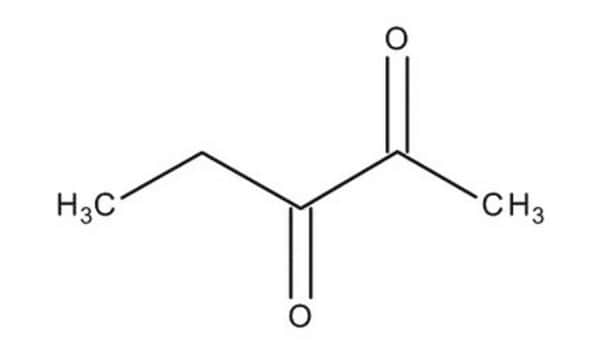144169
2,3-Hexanedione
technical grade, 90%
Synonym(s):
Acetyl butyryl
Sign Into View Organizational & Contract Pricing
All Photos(2)
About This Item
Linear Formula:
CH3CH2CH2COCOCH3
CAS Number:
Molecular Weight:
114.14
Beilstein:
1699896
EC Number:
MDL number:
UNSPSC Code:
12352100
PubChem Substance ID:
NACRES:
NA.22
Recommended Products
grade
technical grade
Quality Level
vapor density
3.9 (vs air)
vapor pressure
10 mmHg ( 20 °C)
Assay
90%
form
liquid
refractive index
n20/D 1.412 (lit.)
bp
128 °C (lit.)
density
0.934 g/mL at 25 °C (lit.)
functional group
ketone
SMILES string
CCCC(=O)C(C)=O
InChI
1S/C6H10O2/c1-3-4-6(8)5(2)7/h3-4H2,1-2H3
InChI key
MWVFCEVNXHTDNF-UHFFFAOYSA-N
Looking for similar products? Visit Product Comparison Guide
General description
2,3-Hexanedione is a major component of the male-produced aggregation pheromone of Anelaphus inflaticollis Chemsak. It reacts with ethylenediamine to yield macrocyclic tetradentate 12-membered nitrogen donor (N4) ligand.
Application
2,3-Hexanedione was used to evaluate the influence of xanthan concentration on the release of aroma compounds in xanthan-thickened food model systems.
Signal Word
Warning
Hazard Statements
Precautionary Statements
Hazard Classifications
Flam. Liq. 3 - STOT RE 2 Inhalation
Target Organs
Respiratory system
Storage Class Code
3 - Flammable liquids
WGK
WGK 2
Flash Point(F)
82.4 °F - closed cup
Flash Point(C)
28 °C - closed cup
Personal Protective Equipment
dust mask type N95 (US), Eyeshields, Gloves
Choose from one of the most recent versions:
Already Own This Product?
Find documentation for the products that you have recently purchased in the Document Library.
Customers Also Viewed
Sulekh Chandra et al.
Spectrochimica acta. Part A, Molecular and biomolecular spectroscopy, 60(13), 3079-3085 (2004-10-13)
Complexes of Cr(III), Co(II), Ni(II) and Cu(II) containing a novel macrocyclic tetradentate nitrogen donor (N4) ligand prepared via reaction of 2,3-hexanedione and ethylenediamine has been prepared and characterized. The newly synthesized ligand (L) and its complexes have been characterized on
A M Ray et al.
Environmental entomology, 38(5), 1462-1466 (2009-10-15)
We report the identification and field bioassays of a major component of the male-produced aggregation pheromone of Anelaphus inflaticollis Chemsak, an uncommon desert cerambycine beetle. Male A. inflaticollis produced a sex-specific blend of components that included (R)-3-hydroxyhexan-2-one, (S)-2-hydroxyhexan-3-one, 2,3-hexanedione, and
Egle Bylaite et al.
Journal of agricultural and food chemistry, 53(9), 3577-3583 (2005-04-28)
The influence of xanthan concentration (0, 0.02, 0.1, 0.4, and 0.8% w/w) and bulk viscosity on the release of 20 aroma compounds of different chemical classes (5 aldehydes, 4 esters, 5 ketones, 3 alcohols, and 3 terpenes) was evaluated in
Emerson S Lacey et al.
Journal of chemical ecology, 30(8), 1493-1507 (2004-11-13)
This is the first fully verified report of an aggregation pheromone produced by a cerambycid beetle species. Field bioassays with adult Neoclytus acuminatus acuminatus (F.) (Coleoptera: Cerambycidae) revealed that males produce a pheromone that attracts both sexes. Extracts of odors
Molecular mechanism of hexane neuropathy: significant differences in pharmacokinetics between 2.3-, 2.4-, and 2.5-hexanedione.
K Iwasaki et al.
Industrial health, 22(3), 177-187 (1984-01-01)
Our team of scientists has experience in all areas of research including Life Science, Material Science, Chemical Synthesis, Chromatography, Analytical and many others.
Contact Technical Service














